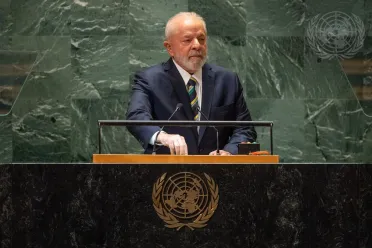Statement
Statement summary
LUIZ INÁCIO LULA DA SILVA, President of Brazil, recalled that 20 years ago, speaking at the General Assembly, he expressed confidence in the human capacity to overcome challenges and evolve towards superior forms of coexistence. “I return today to say that I maintain my unshakeable trust in humanity,” he stressed, while pointing to the severity of the climate crisis that “knocks on our doors and imposes losses on our brothers, especially on the poorest”. Noting that hunger — that today affects 735 million people globally — was at the centre of his speech in 2003, he emphasized: “The world is increasingly unequal. The 10 richest billionaires have more wealth than the poorest 40 per cent of humanity.”
“If today I return in the honourable capacity of President of Brazil, it is thanks to democracy,” he underscored, emphasizing that “hope, once again, has won over fear”. His country “is back” to make its contribution towards global challenges, he stressed, while also noting that it has reclaimed its foreign policy’s universalism, marked by a respectful dialogue with everyone. Recognizing that the 2030 Agenda could turn into the biggest failure of the UN, he underscored the importance of reducing inequalities by including the poor in Government budgets and making the rich pay taxes proportional to their wealth. Further reiterating Brazil’s commitment to the Sustainable Development Goals, he added: “We want to achieve racial equality through the eighteenth [Sustainable Development] Goal, which we will voluntarily adopt.”
In this regard, his Government has launched a zero-hunger programme and passed a bill on equal pay for equal work and gender equality. Recalling that the Global South is the most affected by climate change, he pointed out that Brazil — by generating 97 per cent of its electrical power from clean, renewable sources — has proven that a socially fair and environmentally sustainable model is possible. He also highlighted the immense potential for generating green hydrogen and reported that, having resumed tackling environmental crimes in the Amazon, his country managed to reduce deforestation by 48 per cent in eight months. Expressing regret that the promise to allocate $100 billion to developing countries has not been fulfilled, he recalled that, in 2022, the International Monetary Fund (IMF) has made available $160 billion in special drawing rights to European countries and only $34 billion to African countries. While the foundations of the new economic governance have not been laid, he said that BRICS [Brazil, Russian Federation, India, China, South Africa] — a strategic platform for emerging countries cooperation — was a result of this paralysis.
He went on to say that during Brazil’s chairmanship of the Group of 20 (G20) in 2024, under the motto “Building a just word for sustainable planet”, the country will coordinate social inclusion and fight against hunger. Noting that there will be no sustainability and prosperity without peace, he underscored the importance of promoting a culture of peace. While referring to a number of ongoing global crises, including the war in Ukraine, he added: “No solution will be lasting if not based on dialogue.” Reporting that military spending has totalled $2 trillion, with nuclear spending reaching $83 billion — 20 times higher than the regular UN budget — he emphasized: “The UN was born to be the home of understanding and dialogue.” Further, he rejected unilateral sanctions, including Cuba’s economic and financial embargo, and criticized any attempts to divide the world into zones of influence and revive the cold war.
Speaking at the annual debate of the UN General Assembly in New York, Brazil’s President Lula da Silva lamented growing global inequalities and discussed his country’s role spearheading climate change diplomacy within the Global South.
Full statement
Read the full statement, in PDF format.
Photo

Previous sessions
Access the statements from previous sessions.
